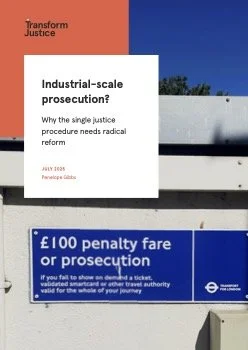Industrial-scale prosecution? Why the single justice procedure needs radical reform
ByPenelope Gibbs
The criminal justice system is in crying need of more efficiency but there is little space to be innovative. So what’s not to like about a process which has revolutionised the magistrates’ court? The single justice procedure, introduced ten years ago, makes summary justice far speedier and cheaper. It needs fewer court staff and judges than a traditional open court hearing, and defendants can plead guilty and submit mitigation online. A case can be processed within weeks rather than months. Transform Justice has followed the progress of the single justice procedure (SJP) since its launch in England and Wales in 2015. We have written many articles about it, briefed journalists and made it the subject of our first ever podcast episode, but never brought our evidence together. In this report we acknowledge the potential benefits of the SJP but also express our deep concerns about the justice it delivers. Just as in the case of the Post Office Scandal, the victims are organisations and companies who are trying to protect their revenue or ensure behavioral compliance. They are both victim and prosecutor, which may cloud their objectivity in decision-making. It is in the interests of any prosecutor to produce the minimum of evidence to get a conviction and to have as few people as possible contest the charge. The SJP fits the bill. Most offences are strict liability so prosecutors don’t have to prove the suspect intended to commit a crime, nor do they need to prove their prosecution is for the public benefit (partly because no-one ever challenges them to do so). So prosecution is relatively easy. Getting convictions is easy too, because most people don’t respond to their prosecution under SJP and are convicted in their absence. A tiny minority of defendants plead not guilty. No data is available on what proportion are acquitted. Procedural justice is defined as the fairness of processes used by those in positions of authority to reach specific outcomes or decisions. This report measures the SJP against that test and finds it wanting. Many people who transgress are willing to make amends. But SJP defendants also need to know what their rights are and how to exercise them, and most don’t. So far, no-one (apart from some journalists) has been that interested in finding out about their experience and amplifying their voice. But change is coming. We hope that procedural justice and fair trial rights will be at the heart of SJP reform.
London: Transform Justice, 2025. 36p.


